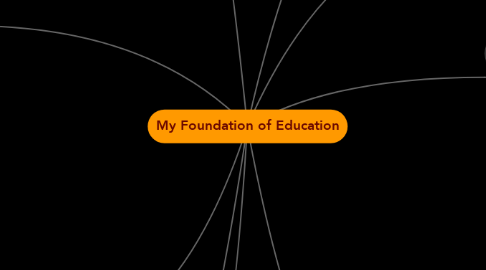
1. Philosophy of Education
1.1. Pragmatism
1.1.1. is viewed as an American philosophy that developed in the latter part of the 19th Century from the greek word that means work. It encourages people to find processes that work in order to achieve their desired ends.
1.1.2. problem-->speculative thought-->action--> results
1.1.3. Key researchers are George Sanders Pierce, William James, John Dewey, Frances Bacon, John Locke, Jean-Jacques Rousseau.
1.1.3.1. John Dewey's ideas about education, progressive, proposed that education start with the needs and interest of the child in the classroom, allow the child to participate in the planning. He rested on the notion that children are active organic beings growing and changing so he decided a course.
1.1.3.1.1. Freedom and Responsibility
1.1.4. The goal of education
1.1.4.1. Dewey's vision of schools was rooted in social order, he believed that school should function as preparation for life in a democratic society
1.1.4.2. Dewey's primary role of education was growth. He stated that education had no other goals than growth- growth leading to more growth
1.1.5. The role of the teacher
1.1.5.1. the teacher is no longer the authoritarian figure from which all knowledge flows, but is the facilitator. The teacher encourages, offers, suggests, questions, and helps plan and implement courses of study as well as writing curriculum.
1.1.6. Methods of instruction
1.1.6.1. children learn by participate in group work and individually. The problem- solving or inquiry method
1.1.6.2. Formal instruction abandoned, time blocks eliminated, furniture replaced with tables and chairs. Children could converse quietly and move about.
1.1.7. Curriculum
1.1.7.1. all academic and vocational discipline are integrated in a interconnected way
1.1.7.2. progressive educators support starting with contemporary problems and working from the known to the unknown, or social studies education. Expanding environments.
2. Schools of Organizations
3. Curriculum and Pedagody
3.1. State Senators are Richard Shelby and Jefferson Sessions. House of Representative Mo Brooks of Dist. 5. State superintendent is Dr. Tom Sisk local Superintendent is W.L. 'Trey' Holladay III. Local School Board Russell Johnson, Beverly Johnson, Dr. Chris Paysinger, Ms. Jennifer Manville, Mr. James Lucas, Mr. Scott Henry, Mr. Tim Green
3.2. The social efficiency was rooted in the belief that different groups of students, with different sets of needs and aspirations, should receive different types of schooling.
3.3. Transforrmative
3.3.1. tradition rests on a different set of assumptions about the teachings and learning process.
3.3.2. The purpose of education is to change the student in some meaningful way, including intellectually, creatively, spiritually, and emotionally.
3.4. Social efficiency curriculum
3.4.1. The social efficiency was rooted in the belief that different groups of students, with different sets of needs and aspirations, should receive different types of schooling.
4. Equality of Opportunity
5. Education Inequality
6. Sociological Perspective
7. History of U.S. Education
8. Politics of Education
8.1. The Liberal Perspective
8.1.1. The capitalist economic system has great capacity to be productive, however, if left unrestrained, capitalism often creates far too much political and economic disparity.
8.1.2. sees the role of education as balancing the needs of society and the individual in a manner that is consistent with a demographic and meritocratic society.
8.1.3. argues that schools place emphasis on discipline and authority, thus limiting their role in helping students develop as individuals
8.1.4. Supports programs that enhance equality of opportunity for disadvantaged groups, including Head Start, affirmative action programs, compensatory higher education programs
8.1.4.1. Early start programs are so beneficial to children at a young age. Working as a substitute in a kindergarten class, and knowing some of the children from a previous learning center, I noticed a significant level of readiness from those children that attended school prior to kindergarten.
8.1.5. PROGRESSIVE VISION
8.1.5.1. Although traditional visions and values play a role in the vision for education as a whole, progressive visions will allow schools to as well as individuals to steadily improve and progress.
8.1.5.2. "If we teach today as we taught yesterday we rob our children of tomorrow"- John Dewey
8.1.5.3. "Education [is] not an end in itself but [is] the first step in a progress which should continue during a lifetime" -Caroline Pratt
8.1.5.4. In this creative approach to learning the progressive vision will allow students to use their outside-of-box solutions and critical thinking skills to gain knowledge from experience
